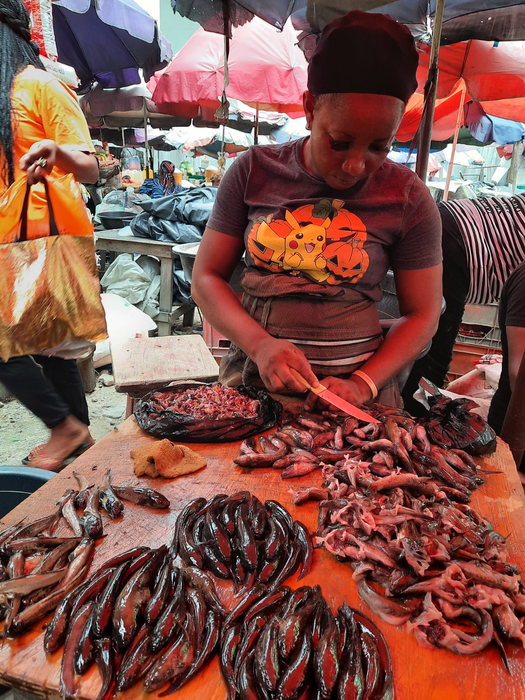The African BioGenome Project (AfricaBP) published a position paper in the journal Nature highlighting the goals, priorities, and roadmap of the impressive Africa-led effort to sequence the genomes of plants, animals, fungi, and protists that are endemic to the continent of Africa.

Credit: Julian Osuji
The African BioGenome Project (AfricaBP) published a position paper in the journal Nature highlighting the goals, priorities, and roadmap of the impressive Africa-led effort to sequence the genomes of plants, animals, fungi, and protists that are endemic to the continent of Africa.
Professor Nicola Mulder head of the Computational Biology division at the University of Cape Town (UCT) and Principal Investigator of H3ABioNet an institutional partner to AfricaBP, is one of three advisory board members to this important project.
Following its pilot launch in June 2021, AfricaBP now hosts 109 African scientists and 22 African organisations, representing researchers, institutions and corporations from all five regions in the African Union. AfricaBP is a partner to three complementary large-scale, global genomic efforts including the 10,000 Plants Genomes Project (10KP), the Vertebrate Genomes Project (VGP), and the Earth BioGenome Project (EBP).
AfricaBP has built a strong case for the need to understand the continent’s biodiversity through genomics and ensure sustainable use of native plants, animals, fungi, and protists. For example, culturally relevant food resources, such as orphan crops, and other staples that are crucial to regional food security, remain unsequenced. This genetic information is important to safeguard biodiversity and improve resilience in response to future environmental pressures such as climate change.
Therefore, collecting, sequencing, and storing genomic information on the continent – by and for the African people – is a fundamental priority for AfricaBP. This will build resilience in breeding, sustainable food systems, and biodiversity conservation across the continent to deliver on the goals of the post-2020 Global Biodiversity Framework of the Convention on Biodiversity (CBD) and the United Nations Sustainable Development Goals while complementing efforts by the Human Hereditary and Health (H3Africa) consortium.
The primary goals of AfricaBP cannot be accomplished without support from African governments, the African Union Commission, national and regional agencies, and international partners and organisations. Recognising the errors of the past, AfricaBP plans to move forward with an equitable process to share the benefits materialised from its activities. For example, it will work with policymakers on recommendations for laws and regulations governing national access and benefit sharing to include a cohesive continental agenda, while following and adapting the Nagoya Protocol for the project’s needs.
In addition to new policies to support AfricaBP, national governments will need to work in collaboration with regional and international partners to invest in infrastructure to support genomics and bioinformatics in Africa. The estimated cost for AfricaBP is USD1 billion (̴R1.15 billion) over 10 years. While this may seem like a huge endeavor, such an investment not only benefits the research enterprise, but will have a return multiple times over in economic development to meet sustainable development goals.
Beyond the direct benefits of new technology and economic growth guaranteed by discoveries and investments in genomics and bioinformatics in Africa, AfricaBP also plans to develop a knowledge hub for the field. Continuous and sustained investment in the early-career pipeline to support this effort – including universities and other technical education – will ensure opportunities for African scientists and incentives to stay in Africa after they have received training through genomics and bioinformatics projects housed on the continent. AfricaBP envisions developing a fellowship for early-career researchers to invest in the next generation of scientific leaders and sustain this vital work into the future.
“AfricaBP is not just a scientific project, but a socio-scientific project through which we hope to bring genomics and bioinformatics capacities closer to the African people,” said ThankGod Echezona Ebenezer, founder and Co-Chair of AfricaBP as well as a Bioinformatician at the European Bioinformatics Institute, United Kingdom.
Roksana Majewska, AfricaBP Pilot Committee Chair and a researcher at North-West University shared: “AfricaBP is a huge, bold, and potentially truly transformative endeavor, which has a real chance to meaningfully support the autonomy, sustainable growth, and long-term wellbeing of African communities.”
“AfricaBP will ensure that cutting-edge scientific technologies that have mainly been accessible in high income countries are available for use within the continent,” added Anne Muigai, current Chair of the AfricaBP and Professor of Genetics at the Jomo Kenyatta University of Agriculture and Technology in Kenya.
Overall, AfricaBP is committed to improving food security, natural resources conservation, and open data sharing in an inclusive and equitable way that centres on the priorities of the African people. It is an ambitious and promising project ready to lead the continent onto the next big stage of research and innovation.
Journal
Nature
DOI
10.1038/d41586-022-00712-4
Method of Research
Commentary/editorial
Subject of Research
Not applicable
Article Title
Africa: sequence 100,000 species to safeguard biodiversity
Article Publication Date
15-Mar-2022




